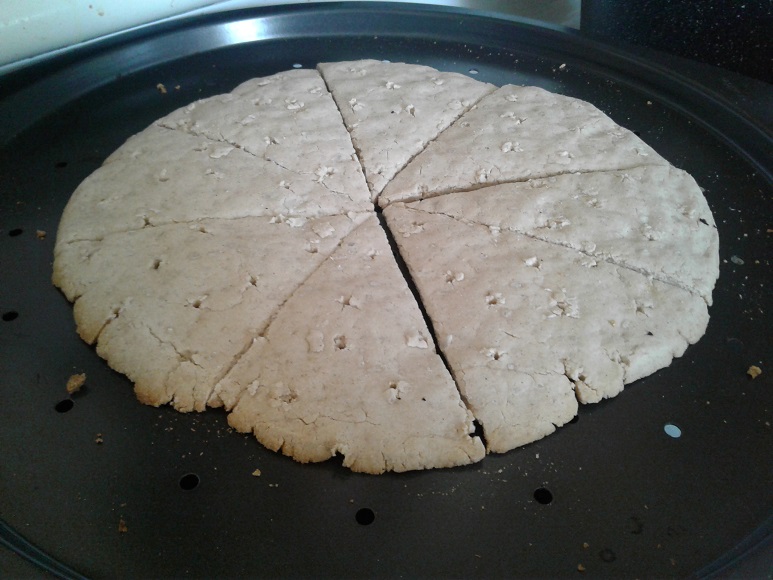Châff Mnópap (Orcish Hardtack)
Orcish hardtack is adapted from traditional hardtack, using flours that grow better in their climate
When the Balorians settled Elatha, they were faced with a difficult dilemma in food security. The significant staple grains of wheat, rye, barley and corn did not find suitable widespread agricultural environments in the regions of Elatha that are inhabitable under the extreme climate conditions of the planet. The extremes of temperature and humidity led to either an extremely short growing season, or the spreading of mold and disease. In the early days of settlement, this resulted in massive crop failures and widespread famine.
While most of these crops are still cultivated in small hobby farms and as supplementary grains in the limited places where they thrive, for the most part, the Balorian staple diet now incorporates a variety of staple grains and starches that are not typical of most of their cultures of origin: namely, rice, sorghum, quinoa, millet, plantain, and potatoes and yams.
So many recipes that would be familiar to many starfaring cultures still exist, but have been altered to incorporate the conditions of the Balorian staple diet. Châff Mnópap, which simply means "hard bread," is one such recipe. Like other forms of Hardtack or "ship's biscuit," this unleavened bread is intended to keep for long periods of time, and is baked with the intention of removing most of its moisture for this purpose.
Preparation
It may be helpful to acquire a pizza pan that is designed to aerate the dough as it's cooking. You can find wire pizza pans, or something like mine, which is a pizza pan with holes distributed throughout its surface. If you don't have this or don't want to find one, no problem: a simple pizza pan or cookie sheet will do. Preheat your oven to 375 °F (190.5 °C). Obviously most ovens among the starfaring cultures do not have this accurate of a temperature gauge (except, perhaps, ovens used by the Gnomes and Goblins,) but that just means preparing a medium-hot oven. Stir the dry ingredients together in a mixing bowl. Mix thoroughly. Start by adding your refined, liquefied coconut oil directly to the dry ingredients and working it through as much as you can. Work your water into the dry ingredients about a half cup at a time. Knead the dough until you get a consistency that's just pliable enough to be worked. You may not require all the water; or you may need a bit more. Conditions will vary depending on humidity in the air, air pressure, and a variety of other factors. Some non-orcish cookbooks suggest that you should roll out the dough with a rolling pin. Since anyone who does any regular gluten-free cooking knows that the idea of rolling out gluten-free dough is laughable, I would suggest you use the orcish method, which is to pound the dough flat onto a pan with your hands instead, until it's about an inch thick. Form it into the shape of your pan. Poke holes in the dough at regular intervals. You can get a dough docker for this purpose, or you can do what I did, which was to poke holes with a bamboo skewer in orcish tradition. I had the holes in my pan to guide me, but just make sure they're roughly evenly-spaced. Bake for 10 minutes, then take the pan out and cut your ship's biscuit into equal pieces. Most recipes will tell you to cut your dough into square biscuit shapes. I think it also works just fine cut into slices, if you're using a round pan. The point is to make the portions about even, since it's traditionally intended as a ration for a soldier, sailor, or spacer. Typically they are each issued a pound of châff mnópap a day. Return to the oven and bake for 20 to 25 more minutes. Remove from oven and let sit until at least completely cool. I'd give it a couple of hours, if not overnight. Re-heat your oven, and when it reaches the appropriate temperature, bake your châff mnópap again for at least 15 to 20 minutes. "Twice-baked" is one of the epithets that ship's biscuit has acquired, and this is why. The purpose is to make sure that as much water as possible is removed from the biscuit, so that it will survive storage for long periods without spoiling. Allow to cool completely before storing. Store in a cool, dry place that's out of direct sunlight for maximum preservation.Don't forget that you can click on the blue compass on the left to access the Table of Contents at any time!

Want to read all of the Toy Soldier Saga fiction, even before the rest of the world does?Subscribe now!
Ingredients:
- 2 1/2 cups (591 ml) sweet sorghum flour
- 1 cup (250 ml) chickpea flour*
- 1 cup (250 ml) tapioca flour*
- 1/2 cup (118 ml) refined coconut oil
- 3 tbsp (44 ml) salt
- about 1 1/2 cups (355 ml) cold water
Notes and Substitutions:
*If you have access to a pre-prepared all-purpose gluten free flour blend, you can replace the chickpea and tapioca flour with the all-purpose flour instead. Most commercial all-purpose gluten-free flours use a blend of these flours as their bases. When the orcs lay in provisions intended to survive a single season, they often add up to 9 heaping tbsp (about 225 ml) of brewer's yeast for additional nutritional value, but ship's biscuit is not prepared in this way, as it may have to last for years before it is eaten by sailors and spacers.This was a much longer trip through interstellar space. Forty days, forty nights. The crew felt it hard, with about six weeks between resupply points and all the slaves making extra bodies on board. Meals dwindled to pickles, jerky they had to fight the rats for, and weevil-infested hardtack.






Orcish Hardtack! Now, how many of the Orcs dip it in their Graf to soften the hardtack up when eating?
Probably ALL of them. :D
LOL! :D